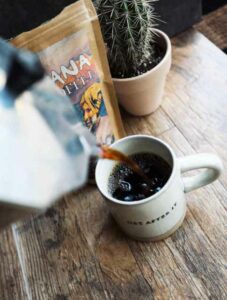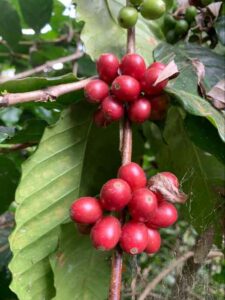Coffee has astounding health benefits, with many studies now considering it a natural superfood. It’s also one of the most chemically treated crops in the world. I don’t want to ingest harmful chemicals, and this is why I choose coffee brands like Sapana.
 As a social worker living with autoimmune disease, it’s important to me on a personal, social and environmental level to know where my money goes and what I put into my body. But, the difficulties in tracing coffee supply chains makes ethical transparency nearly impossible.
As a social worker living with autoimmune disease, it’s important to me on a personal, social and environmental level to know where my money goes and what I put into my body. But, the difficulties in tracing coffee supply chains makes ethical transparency nearly impossible.
When Sapana co-founders, Dan Maurer and Anthony Mancini, began importing coffee into the U.S. in 2018, I was in the midst of managing a personal health crisis through a strict elimination- and nutrient-dense diet. With this came the elimination of coffee. My doctor advised that coffee’s commonly high pesticide levels had been irritating my system and intensifying my autoimmune symptoms.
After joining Dan and Anthony on a two-hour Zoom call several months ago, I learned about the complexities of a coffee bean’s journey from seed to cup. This conversation paired with my personal health journey and grad school thesis on ethical Fair Trade practices left me even more committed to ethically sourced coffee.
Here’s a bit more of what I learned, and what I think all of you coffee lovers would like to know as you think about your next sip:
Health
Coffee beans are porous, so they’re good at soaking up ingredients like chemicals from pesticides, plastics, dirty water, and dirty tarps. When we don’t consciously source our coffee, we may end up sipping these byproducts with our morning coffee (not the breakfast you imagined!). Pesticides can cause short-term and chronic adverse effects, including rashes, nausea, dizziness, diarrhea, depression and anxiety.
I’ve personally experienced many of these health impacts.
Chemical treatments can also be detrimental to those who live and work in coffee-producing areas. Farmers can become exposed to high levels of chemicals while spraying and handling their crops. Chemical residues in the air and water may impact the surrounding communities.
When farmers cultivate beans with organic (as opposed to chemical) pesticides, the vitamins, minerals, and antioxidants in coffee beans can enhance the immune system and boost protection against cell damage.
Cultivating Sapana
Sapana’s beans grow on one single farm in Nepal’s Rasuwa district. Local farmers and “pickers” work at various times throughout the cultivation season to remove the outer bright red colored rind of the coffee beans. They use an organic fertilizer made from the farm’s compost, then filter the beans through spring water and lay them in the sun to dry, turning them a few times daily. After seven to nine days, these workers transport the beans to a warehouse where they remove the final parchment of the bean.

As Dan, Anthony and I spoke, they compared the parchment to a pistachio shell to help me visualize this part of the process.
They also painted a picture of Nepalese women sitting among a sea of coffee beans, sorting and removing the “imperfect” beans. Brown coloring means a bean would produce more sour coffee, for example. A photo sorter machine typically handles this process on larger farms. However, Sapana’s single-origin farm rests on the side of a hill where farming machines are unusable. As a result, everything is done by hand. This sorting out of imperfections translates to what we know as specialty coffee.
Specialty Coffee
The story behind the specialty coffee you see at your local coffee shop may seem like just an expensive trend, but it’s much more than that. Defined by its distinct flavor and quality, specialty coffee represents the place it comes from. Conventional coffee (ie. a commodity), on the other hand, is mass-produced and unspecialized. There’s no distinction in its origin or who produced it. Farms export these beans whether they’re sour or not, as it drives down the cost for distributors and consumers.

Sapana’s thoughtfully cultivated beans rarely have imperfections. At the time of this post, coffee evaluation experts called Q Graders have offered Sapana cupping scores between 84 and 87.5 out of 100. A coffee is considered Specialty at 80 and above. You can think of Q graders like wine sommeliers. Each goes through a strict licensing and certification process to evaluate coffee based on the Specialty Coffee Association (SCA) practices.
The choice to use one farm (single-origin) allows Dan and Anthony to run data on their beans, then submit the final products for testing through a Q Grader. Sapana then uses these cupping reports to track progress annually. This helps Sapana to improve and expand its product and provide coffee lovers with the best cup of coffee they can find.
Impact
As Sapana grows in popularity, its proceeds also grow job opportunities in remote Nepal villages. Since farmers do everything by hand, it helps keep jobs and Nepali culture alive, and families and communities together. Sapana farmers use their own available resources, which allows for a self-sustaining cultivation process. Dan explained that this is a way to pair Western ideology with Nepali ingenuity.
Ethical sourcing
Ethical sourcing means that farmers get a fair wage for their work, while roasters maintain control over the quality of their beans. Coffee is the second most popular beverage in the world after water and the top selling product in the world only after oil. This demand has led to oppressive practices for many small farm producers, including low wages and forced labor.
I asked Dan and Anthony about Sapana’s worker wages. No one in Sapana’s supply chain makes a ton of money, they explained, and “everyone gets a fair wage.” By contrast, farmers and growers in conventional supply chains make minimal profit while distributors and retail sellers rake in the dough.
Dan and Anthony are among the few coffee importers in the world to personally trace Sapana from seed to cup. They’ve not only witnessed the entire cultivation process firsthand, but they import their own beans into the U.S. This avoids coffee brokers and allows Sapana to more heavily monitor and regulate its own process.

Anthony summed this up well: “If your cup of coffee costs one dollar, someone along that supply chain is likely being treated unfairly.” In other words, if you’re drinking cheap coffee you’re likely getting a cheap product. And cheap products often come with negative consequences for someone along the supply chain.
As a general rule, the more expensive a coffee is the more you can trust it.
USDA Organic
The lack of transparency in coffee supply chains supports the importance of buying organic coffee. However, the USDA Organic label is also incredibly expensive – about $80k over four to five years. For a small nonprofit like Elevate Nepal, that’s a lot of money, which goes far in a developing country like Nepal.
For context, Elevate Nepal funded the building of a 700-student earthquake-proof school in 2019 for $85k. Even though Dan and Anthony can attest that Sapana is truly organic, they decided to bypass the official label and prioritize the organization’s money for projects like Sarsyu Primary School – at least for now.
Final thoughts
Given the lack of transparency in the coffee industry, it’s important to choose coffee companies with ethical and transparent sourcing practices.
“We are so disconnected from our food,” Dan said. But, you don’t have to be with Sapana. Quite the opposite, actually. Each sip of Sapana is free of harmful chemicals. It supports Nepali farmers and employs people in their community.
Coffee and I still don’t get along all the time. But, when we do, I enjoy the comfort and ethical impact of a warm cup of Sapana. And if you haven’t tried it, I bet you would too.


